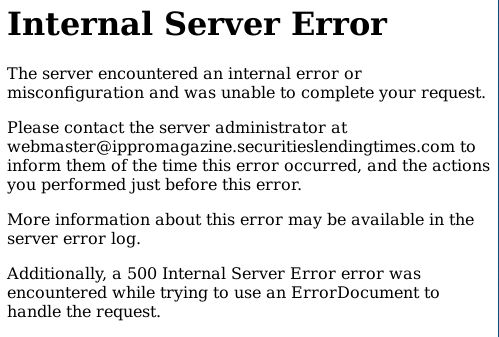

An insider from the European Patent Office (EPO) recently told me EPO was in ICU. Many examiners feel that way; an EU politician from EUIPO, António Campinos, is their boss now, lying to them like a typical politician. Does he expect to earn respect by lying to staff representatives and staff?
"WTR opens up its archives, reminding us that Campinos came out of nowhere to spearhead an EU agency that months before his departure he outsourced the India (parts of IT at least).""The UK Government has confirmed that it will not seek participation in the proposed EU Unified Patents Court (UPC) or Unitary Patent if these are introduced," wrote one law firm some days ago in its Web site (under "Intellectual Property [sic] - managing the Brexit transition") and then in Lexology. They're coming to accept this reality.
"Most – but not all – IP [sic] lawyers say that allowing only the Supreme Court to depart from retained EU law after Brexit will be best for the industry," said another new article from Managing IP, which spent years advocating the UPC on behalf of litigation firms. Managing IP is a really bad site (almost as bad as IAM), as it's more like a lobbying front disguised as "journalism"; days ago it wrote about EQE going online and the simple fact that "UK leaves UPC"; this, for a change, was mostly OK coverage, but it quoted Bristows to seed doubt about the impact of the move; to be fair to him (he is really irritated by Techrights, constantly moaning about us in Twitter), this one piece is not as misleading as some prior coverage from that same author, a UPC booster in 'reporter' clothing. His colleague, however, is still pushing UPC agenda, as he has done for years in sites owned and controlled directly by litigation firms (with misleading publication names). "Klaus Grabinski," he wrote, "of the Federal Court of Justice, explains why virtual patent litigation is like opera and why endurance is key for the UPC..."
The word "endurance" is suggestive of constantly coming back with unconstitutional agenda. As if mere perseverance can turn illegality into law. Better coverage came from The Register -- coverage which was yesterday picked up by Soylent News, quoting:
The UK has formally ditched the Unified Patent Court (UPC), a project to create a single pan-European patent system that would fix the confusing mess of contradictory laws currently in place.
In a written statement in the House of Commons on Monday, the British undersecretary for science, research and innovation Amanda Solloway noted that: "Today, by means of a Note Verbale, the United Kingdom of Great Britain and Northern Ireland has withdrawn its ratification of the Agreement on a Unified Patent Court."
The reason is, of course Brexit. "In view of the United Kingdom's withdrawal from the European Union, the United Kingdom no longer wishes to be a party to the Unified Patent Court system. Participating in a court that applies EU law and is bound by the CJEU would be inconsistent with the Government's aims of becoming an independent self-governing nation," she said.
[...] The whole idea of the UPC has been fought for over a decade now, making many its adherents borderline fanatical in making it a reality, even more so given frequent setbacks. In their unerring support, however, many seem willing to overlook or turn a blind eye to serious problems, not least of which is the mess that is the European Patent Office (EPO).
[...] The EPO is, of course, a big fan of the UPC and insists the UK leaving is a mere trifle to the larger European dream of a single patent system; a system that would give it significantly more power:
"These economic benefits for European companies and especially SMEs will not be affected by the announcement of the United Kingdom," it insisted in its submission to the German government.
"Even without the UK, the UP package will lead to significant simplification and cost reduction for the companies of the participating EU member states, which is also largely recognized by European companies."
The death of the UPC [techrights.org] through the loss of the UK from Europe was confirmed this way at the beginning of the year. That was one small benefit of Brexit, perhaps the only one. It may be a few years before the crooks pushing for it can regroup and try some other way to sneak software patents into Europe. The UPC was mainly intended as a way of doing an end run around European laws in order to impose software patents. The 1973 European Patent Convention specifically excludes software from patent law, leaving copyright for that.
Now that Groklaw is in archive mode and the other sites have either shut down or changed topics, Roy at Techrights has really been the last one to cover the UPC [techrights.org] or, for that matter, the profoundly corrupt EPO [techrights.org] which has been pushing for the UPC.
The UPC is dead, but the crowd pushing for it has not been jailed yet. So keep your eyes open for further developments and possible need to defend software use (and development) in the EU.

epo.org link) and there are even photo ops for a bunch of people watching a screen! The EPO is once again using COVID-19 for shameless patent propaganda even where patents often stand in the way of research and access to medicines. COVID-19 is mentioned about four times (politicians know no other method other than exploiting a crisis, not only for spying but also joint puff pieces with KIPO and JPO).
The heads of the world's five largest intellectual property offices (IP5) convened for their 13th annual meeting, the first to be conducted by video conference, to take stock of major achievements in their co-operation initiatives over the past year, and address the priorities for IP5 co-operation in view of the COVID-19 pandemic.

